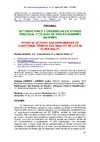Please use this identifier to cite or link to this item:
https://accedacris.ulpgc.es/jspui/handle/10553/57407
| Title: | Actividad física y diferencias de fitness funcional y calidad de vida en hombres mayores | Authors: | Serrano Sánchez, José Antonio Lera Navarro, Angela Espino Torón, L. |
UNESCO Clasification: | 241106 Fisiología del ejercicio 32 Ciencias médicas |
Keywords: | Actividad Física condición física funcional adultos mayores estados de ánimo calidad de vida |
Issue Date: | 2013 | Journal: | Revista Internacional de Medicina y Ciencias de la Actividad Fisica y del Deporte | Abstract: | El objetivo fue examinar las relaciones de la cantidad y tipo de actividad física (AF) con el fitness, calidad de vida y estados de ánimo en 246 hombres
mayores (≥65 años) no institucionalizados. Los participantes cumplimentaron un cuestionario estandarizado de AF (RAPA), calidad de vida percibida
(EuroQOL-5D) y estados de ánimo (CES-D10). Se evaluó el fitness funcional y se tomaron medidas antropométricas, presión arterial y frecuencia cardiaca en reposo. Los datos se analizaron con ANOVA usando dos criterios: tertiles de AF (horas/semana) y participación en AFs organizadas. Los resultados sugieren que la mayor parte de los componentes del fitness funcional son sensibles a la cantidad de AF que se hace, pero las relaciones no son lineales. Las diferencias de fitness solo se observaron entre los tertiles extremos de AF.
La participación en AF organizadas se asoció a una mejora del fitness, salud percibida y estados de ánimo en comparación a las AF no organizadas. The aim was to examine associations between amount and type of physical activity (PA) with functional fitness, quality of life and mood states in 246 male older adults (≥65 years-old) no institutionalized. Participants were interviewed with a standardized questionnaire of PA (RAPA), quality of life (EuroQOL-5D) and depression scale (CES-D10). Functional fitness (Senior Fitness Test), anthropometric and blood pressure were measured. Data were analyzed with ANOVA using two criteria: tertiles of PA (hours/week) and participation in organized PA. Results suggest that almost components of fitness were sensible to total PA performed, but associations appear not to be lineal. Although a trend to dose-response was observed in fitness, differences were significant only when compared extreme PA tertiles. Organized PA was associated to a better fitness, perceived health and depression scale than unorganized PA. |
URI: | https://accedacris.ulpgc.es/handle/10553/57407 | ISSN: | 1577-0354 | Source: | Revista Internacional de Medicina y Ciencias de la Actividad Física y del Deporte[ISSN 1577-0354] (49), p. 6-19 | URL: | http://dialnet.unirioja.es/servlet/articulo?codigo=4177793 |
| Appears in Collections: | Artículos |
Page view(s) 1
1,248
checked on Jan 15, 2026
Download(s)
495
checked on Jan 15, 2026
Google ScholarTM
Check
Share
Export metadata
Items in accedaCRIS are protected by copyright, with all rights reserved, unless otherwise indicated.
